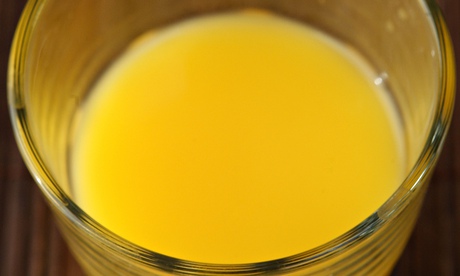
Supposedly healthy supermarket smoothies and juices aimed at children can contain up to eight teaspoons of sugar - more than one-and-a-half times as much as in Coca-Cola, according to a survey carried out for a health campaign group.
A quarter of the products tested had at least six teaspoons for every 200ml glass, the maximum adult daily intake recommended by the World Health Organisation, the research found.
The campaign group Action on Sugar analysed 203 juices, juice drinks and smoothies marketed for children and found that more than a quarter (57) contained as much sugar or more than Coca-Cola, which has 10.6g for every 100ml (equivalent to five teaspoons in a 200ml glass). More than half (117) would attract the red warning on the traffic light labelling system for high sugar content.
The group said the drinks were a “major and unnecessary” source of sugars and calories that were contributing to record levels of tooth decay, obesity and type 2 diabetes among children. It urged parents to give children water or whole fruit instead of juice.
Prof Graham MacGregor, of the Wolfson Institute, Queen Mary University of London, and chairman of Action on Sugar, said: “It is a complete scandal that these drinks are marketed to children and parents as if they are healthy. This has to stop. We need to stop Britain’s childhood obesity epidemic spiralling out of control.”
Among the worst offenders were Asda’s Chosen by Kids Tropical Juice From Concentrate, which contained 13g of sugar per 100ml, and Tesco Goodness Slurper Apple & Banana Fruit Smoothie Snack for Kids, which contained 16.1g of sugar per 100ml.
Fifty-nine products also contained sugar or glucose-fructose syrup as an added ingredient, providing unnecessary extra calories and further damage to growing teeth.
UK health guidelines state that a small (150ml) glass of unsweetened 100% fruit juice can count as one of the recommended five a day. But Action on Sugar said this was misleading and should be withdrawn.
Katharine Jenner, campaign director of Action on Sugar, said: “Juice should be an occasional treat, not an everyday drink. These processed drinks are laden with sugar and calories and do not have the nutritional benefits of fresh fruit and vegetables.”
The group said fruit juice consumption needed to be limited according to the draft recommendations from the World Health Organisation. “For far too long people have been drinking litres of fruit juice thinking it is good for them, but actually fruit juice is loaded with naturally occurring sugars that are released from cells to cause damage to our teeth and it has been associated with type 2 diabetes. Many companies now use the five a day logo on fruit juices even though their products exceed the amount of juice recommended by the government. This is misleading.”
Gavin Partington, director general of the British Soft Drinks Association, said: “Given that government figures show that the vast majority of adults and children are not getting their recommended five fruit and veg a day, it is unfortunate this survey omits to mention the established health benefits of fruit juice, such as vitamin C. Then again, one should not be surprised that politically motivated campaigners are prepared to ignore the evidence in pursuit of their goal.”

